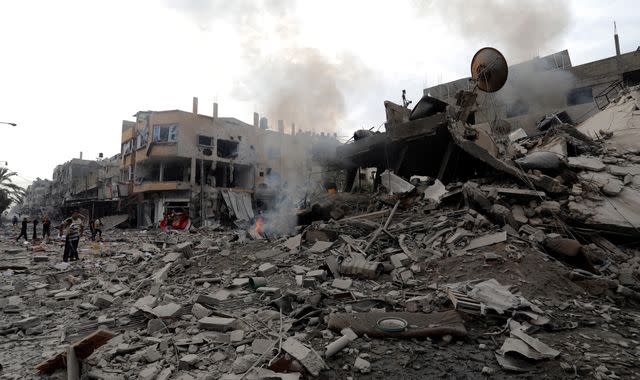Israel's latest ground raid into Gaza is different from what we've seen before

The latest ground raid into Gaza by Israeli troops has an important distinction from previous incursions. This time the soldiers did not immediately pull out after their attack.
Instead, they are "continuing the war" inside the northern part of the enclave in an expansion of Israel's ground operation.
The move is different to a large-scale ground assault but it is still an invasion of sorts while Israeli troops are inside the Palestinian enclave.
Follow live: WHO 'gravely concerned' amid blackout in Gaza
That the offensive seems to be more limited - although it is impossible to know for sure as independent journalists are not thought to be yet embedded with the Israeli military - signals a tactic that for now potentially favours smaller incursions, coupled with powerful airstrikes, rather than pushing ahead immediately with a huge ground manoeuvre - if that is ever going to materialise at all.
Of course, this could change within hours as uncertainty is another deliberate ploy that Israel is using to make its operation harder for Hamas to be able to predict and defend against.
Israel has vowed to destroy Hamas and to rescue more than 220 hostages taken captive by the militant group in the terror attack on 7 October that triggered the war.
But commanders have also said that this time they would be attacking in different ways to how previous conflicts with Hamas have unfolded.
A full-scale invasion is clearly an option but there is also an argument for more limited ground attacks, specifically focused on certain targets such as key individuals and infrastructure like a network of tunnels under Gaza that Hamas operates within.
Analysts also doubt Hamas could be destroyed by military force alone, but significantly degrading the group's military capability is an achievable goal.
In addition, playing into Israel's calculations will be the fate of the hostages, including children, the elderly and foreigners.
Negotiations are still taking place to try to free them but if that fails then special forces trained in hostage rescue would perhaps have the next best chance of rescuing the captives alive.
Read more:
US strikes Iran-linked munition storage sites
Why 'big moment' of Israel invasion may not happen
An overriding consideration has to be the fate of more than two million Palestinian civilians who live in Gaza. More than 7,300 have already been killed since Israel began a relentless campaign of airstrikes in the immediate aftermath of the 7 October terror attack exactly three weeks ago, the territory's Hamas-controlled health ministry says.
It has also imposed a siege on the enclave, with only a tiny trickle of food, water and medical supplies allowed in.
As Palestinian suffering mounts, so do calls from the international community for Israel to agree to a ceasefire. It could make a long war harder to justify so Israel might be seeking to achieve as much as it can as quickly as possible.

 Yahoo News
Yahoo News 
